
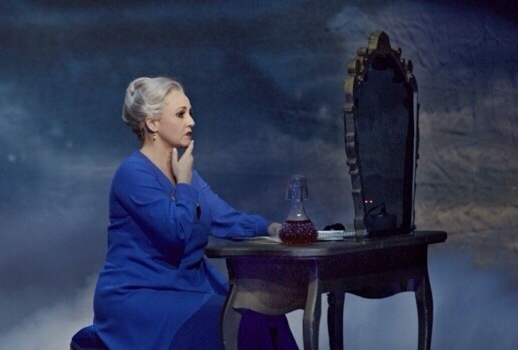
It will come to no surprise to followers of the direction of Stefan Herheim (or to readers of La Cieca’s gushing fangirl appreciations of his work) that his Stuttgart production of Der Rosenkavalier was as “delightfully busy” as we have come to expect. In this case, it was even more so: with a few significant exceptions, the stage was constantly (and literally) in a whirl, with such abundant and vibrant imagery that as soon as the curtain fell I was ready to see the whole thing again—and on second viewing I might catch as many additional details as I took in, breathless, this time around.
As is his usual practice, Herheim places the action of the opera in a formal, somewhat symmetrical unit set. The curtain rises on a broad arch of deep blue, painted with stars and further adorned with tiny electric lamps seen only as points of light. Upstage is a cyclorama depicting a clear night sky above low-hanging clouds, In the center of the stage is a polished disc about 30 feet in diameter.
This platform is slowly revolving amid wafts of carbon dioxide fog, and as the disc turns in brings into our view a middle-aged woman in heavy “glamour” makeup and a coiffure so smooth and flawlessly blonde it can only be an expensive wig. The woman is dressed simply but chicly in a modern cocktail frock of rich royal blue, the same color as the sky around her, and she is seated at a rococo dressing table, tensely observing herself in the mirror. Understand that this first appearance of (as it turns out) the Marschallin occurs before the orchestra plays a note: all that can be heard is faint atonal electronic music suggestive of deep space.
Finally, as the Marschallin and her dressing table reach center stage, she smashes her fist through the glass of the mirror, scattering shards all around the prompter’s box. At that instant, oddly, we suddenly see for the first time the reflection of light from where the mirror should be, a glimmering oblong that illuminates the upstage area.
Only now we realize that the starry sky up there is a scrim and behind it is a stage-spanning screen, painted with a voluptuous scene of the rape of Europa. Then the light reveals a grouping of satyrs, led by the god Pan, but these are three-dimensional figures, alive in fact, and as they jolt into action the famous prelude finally begins.
These hairy figures, with grotesquely oversize erect penises, stalk the Marschallin, who passively reclines to be ravished by them. Suddenly, another “god” appears, the silver-clad Octavian, who descends from the heavens “ex machina” and challenges the horny satyrs. The battle takes place beyond the “sky” scrim as a luxurious bed, pillows and duvet all in the thematic blue silk, glides on.
As the prelude slows in tempo, an open framework like the roof of an art nouveau pavilion descends with billowing royal-blue curtains attached. Also revealed is a structure that eventually we realize is the set in miniature, which is also an upright set of metal dress hoops in the 18th century “pannier” pattern. Draped over it is more royal-blue silk, which turns out to be a dressing gown, again in 18th century style, which the Marschallin slips into.
Oh, and I should mention that inside the “pannier” gizmo there are tiny dolls dressed as the Marschallin, Octavian and (we presume) some other characters of the opera. So we have the familiar theatrical trope of the “dollhouse” microcosm, though, as you will, see, Herheim uses this device in a number of original and intriguing ways.
The major-domo, who is half-man, half-poodle, notes that the visitors include a singer and a flautist, and the look that crosses the Marschallin’s face is that of a woman who just stepped in dog poo. In they troop, a whole menagerie, the Orphans as black-dressed kittens, Annina and Valzacchi as insects, and, for good measure, an enormous pantomime ostrich, surely a pun on the word “Strauss.” Pan takes up the flute to accompany a singer who, as it happens, is the Feldmarschall himself, walking through a wall to confront the Marschallin as the rest of the company. When she returns to the dressing table for her hairdressing appointment, she removes her wig to reveal a stocking cap underneath, like an actress preparing for a performance.Lieber Hippolyte has outdone himself: while Pan was scampering about the stage mesmerizing the company with his elaborate flute cadenza, the ostrich has laid an egg atop the Marchallin’s head!
When the levee company exit, the Marschallin, now in a full Maria Theresa court gown of royal blue faille and a very artificial white wig, catches her breath, and perhaps now we should do so as well.
What’s going on here? I deliberately offered a description of the first part of the act without interpretation so you could see that, whatever meaning you might or might not derive from the staging, purely as a spectacle it is vastly entertaining. And understand that I have only hit some of the high points: the whole stage is filled with activity most of the time. But what does it signify?
Well, to begin with, there are two images always associated with this opera: the Presentation of the Rose (more about that shortly) and the Marschallin looking into her mirror. But this production has already subverted the latter visual: she cannot look into her mirror because she has deliberately destroyed it before the opera even began.Looking into a mirror can be a symbol of looking inside one’s self: “reflecting.” That seems to be what Hoffmansthal is going for in the libretto. (The Marschallin is not merely vain about her looks, but rather that the mirror reveals a truth she does not care to face, i.e., that she is growing older.) By having her break the mirror, Herheim seems to be saying that the Marschallin is deliberately avoiding self-knowledge, a broad extension of the motif of stopping the clocks to avoid facing the fact of the passage of time.
What is it, then, that the Marschallin does not want to face? Well, the action immediately following the smashing business (significantly, the action accompanying the actual start of the music) is an indication: she is in a situation where she feels powerless and abused, and she has a fantasy of rescue in the form of a young man. (That he is a fantasy is obvious enough in that he isn’t in the room at the beginning of the opera, but rather arrives like a baroque god.)Further, the Marschallin is haunted by various manifestations of Pan, who is (among other things) identified with sexuality. I think it is significant that, unlike his goatish followers, Pan is not actually threatening in this production; rather, he is puckish, playful, sometimes annoying but never dangerous. So sexuality per se is not sinister; rather, the problem is the Marschallin’s inability to associate sexuality with intimacy, tenderness.
So she invents an alternative reality in which she loves and is loved by a sweetly innocent youth, a boy who treats her delicately and is always available to protect her from the rougher handling of, for instance, Ochs—who, by the way, explicitly identifies himself with Jupiter in his long first act monologue, that same Jupiter seen in the decor in the from of a bull ravishing poor Europa.
But even this dream lover the Marschallin has invented is less than ideal: he is an ageless child and she, poor mortal, is a woman on the brink of middle age. So the next step in the Marschallin’s wrong-headed plan involves those fragments of mirror wrought by Pan into the silver rose. She will, in effect, send Octavian back in time to meet her before her arranged marriage. And she is stacking the deck even farther by switching out the naive girl she was for another girl who is wiser than she. That girl’s name, in fact, is “Wisdom” (Sophie).
We—perhaps less distracted by a midlife crisis than the poor Marschallin—are given a chance to (here’s that word again) reflect on these ideas because Herheim stages the next scenes with great simplicity, almost plainly. One beautiful touch is that as the duet with Octavian progresses, he gradually backs upstage as the “sky” scrim descends. His last words seem to come from another world altogether, and then his special goes out and he has vanished.
The silver rose, in its carrying case of royal-blue velvet, the Marschallin sends off into the past with Pan/Mahomet, stopping him for just a moment to add her own special touch to the gift. Reaching into her vanity table, she takes out a small vial, then sprinkles a few drops of (obviously) Persian Rose Attar onto the ornament. When Octavian arrives in the past, it is assured he will fall in love with Sophie, because he already associates the rose perfume with the Marschallin. And we, the audience, most of already knowing what will happen after the intermission, sigh, “of course!” (This business I think could work even in the most realistic of Rosenkavaliers, but here it is the very height of poetry.)
“Mahomet” doesn’t leave right away, though. (Why should he? The past will be there forever.) As the Marschallin stands there thinking or dreaming, Pan rearranges the dolls in the “pannier” to place the Marschallin figurine center stage. As the revolve takes the real Marschallin away and the doll directly opposite the prompter’s box, the curtain slowly falls.
More livestock inhabit the Faninal mansion: he himself is a strutting rooster, the duenna Marianne a fidgety old hen, and the servants variously sheep and monkeys. The curtain rises with Sophie, in an exact duplicate of the Marchallin’s first act gown and wig, turned upstage, thus establishing the identity between them. This is a much more grave and serious Sophie than we usually see: no fluttering or running about, but rather the depiction of an intelligent young woman in the midst of an important life passage. The upstage towers swarm with a multitude of servants running to and fro and up and down, frantically cleaning in between craning out the windows.
The dome structure and the blue silk curtains descend as Octavian arrives, surprisingly rising from the floor on a stage elevator. In a reverse of the usual emotional dynamic, Sophie is cool and collected, but Octavian is so overwhelmed he falls into a faint. Now the curtains slowly part to reveal the sky drop and the stage billows with fog. The stars twinkle and the two young people reel in slow motion: this is limerence.
The young people both bend forward to smell the rose, then look into each other’s eyes not—as you would expect—with ecstasy but rather with gentle recognition. They already know each other, after all, though this is their first meeting according to strict chronology. Again, there are a number of subtle bits in the staging: when boating of how she would deal with anyone who disparaged her family’s good name, she absent-mindedly grabs poor Marianne by the wrist and drops her to the floor in pain. And when Sophie says the politically-correct “Er ist ein Mann, da ist Er, was Er bleibt. Ich aber brauch erst einen Mann, daß ich was bin. Dafür bin ich dem Mann dann auch gar sehr verschuldet,” Marianne mouths the words right along with her. It’s obvious this idea, if not the precise speech, has been central to her education.
The roughhousing with Ochs is a good deal rougher than usual (at one point he throws Sophie over his knee and reaches up her skirt from behind) but curiously the foppish rooster Faninal seems to enjoy seeing his daughter humiliated. The scuffle between Ochs and Octavian is over almost before it begins, and as the “injured” baron is made comfortable, his red wig is removed, revealing a bald head with a bull’s horns.
Octavian and Sophie are left alone in their blue-curtained heaven, and during their frantic duet Sophie seems to suffocate, tearing at her court gown. Octavian undresses her down to a simple silvery shift suggesting the 1911 period of the opera’s premiere. This time it is Annina and Valzacchi who rise up out of the floor. For the various charges and counter-charges, a makeshift scaffold is rolled in and behind the scrim appear the townspeople, now got up for a comic opera version of A Tale of Two Cities, complete with replicas of the baron’s head on pikes. As the mood mellows, the Marchallin’s bed glides on to with Annina now dressed as the Marschallin. She and Ochs canoodle a bit and then, alone, he sings his waltz song and even the revolutionary mob starts to dance. He falls back on the bed, writhing in erotic pleasure, the turntable whirls him around, and upstage, the towers revolve. The entire universe seems to waltz as orgasmically as Emma Bovary does in the Vincente Minnelli film.
And then who should appear but the Marschallin, dressed in a duplicate of Sophie’s silver gown, who quietly approaches the sleeping Ochs and makes a few gestures (magic passes?) over him. She is smiling as the curtain slowly falls.
Now, this unexpected appearance I think reinforces the idea that what we are seeing is the working out some plan by the Marschallin. We are, perhaps, inside the Marchallin’s lucid dream. This idea seems consistent with what happens at the beginning of the third act, which is that Ochs is still asleep on the giant bed, slowly revolving around the stage, as the conspirators set up the “inn” around him. Now in the towers waiters set up little deuce tables, as if in a 20th century supper club, and couples in 1911 formal dress slowly begin to fill up the private rooms. A small screen (with the Europa scene) separates the bed from the elaborate dining table for Ochs, and, oddly, there’s a suggestion of a little dressing room beyond with the Marschallin’s dressing table. (It’s the empty mirror frame that Ochs indicates when he asks about the window, and the Host’s response, “Ein blindes Fenster nur,” actually makes sense: a broken mirror is a window you can’t see through.
Now I don’t know exactly how he did it, but somehow Herheim made the “taunting of Ochs” funny and, for once, not overlong. Part of the secret, I think, is that he introduced some political content into the scary business: the restaurant guests suddenly donned gas masks, and the children were costumed in uniforms of the various WWI forces. Here, perhaps, is Herheim extending his commentary on the folly of living in the past: we are nostalgic for the “good old days” when, for instance, Rosenkavalier was brand-new, but on the other hand, people who were actually around for that series of premieres were in only a couple of years going to land in the worst war the world had seen until that time. (And besides that of course, neither Hoffmansthal nor Strauss regarded the era they were living in as particularly attractive: the text and music yearn for a time a century and a half further in the past.)
Anyway, at least as I interpreted the staging, this act was a revenge fantasy of the Marschallin’s, going back into the past herself (though allied with Octavian) as “Mariandel” (diminutive of “Marie,” the Marschallin’s Christian name.) As the plot is about to dissolve into chaos, the Marschallin herself appears, but not for any rational reason. Instead, she descends on the god-machine, accompanied by her “pannier” dome and billowing blue curtains, her head surrounded by a halo of stars. (You can only imagine how much applause this effect could get in New York, but Stuttgart admired silently.)
Not only has the Marschallin appeared like a fairy godmother to set everything right, she even carries a wand, or rather, the silver rose. Ochs’ confusion about who is whom is completely understandable in this context: they’re all the Marschallin, obviously, because this is her dream. In a spirit perhaps of reconciliation, the Marschallin hands the rose to Ochs, who petulantly flings it to the floor, shattering it. Pan and Sophie gather the fragments, but it cannot be reassembled.
Ochs’ exit is a parody of the Marchallin’s entrance, with the god-machine suddenly belching flame and launching him into outer space. However, “Leopold” (Pan again) does not leave with him, but lingers to observe the denouement.
As the Marschallin interviews Sophie, she undoes the ties on her dressing gown and drapes it over the girl’s shoulders; thus Sophie is now dressed as the Marchallin and the Marschallin as Sophie. And then comes the greatest epiphany of the whole production. Octavian turns to Sophie and calls her “Marie Theres’!”
I have never before in my life cried at this opera, but at this point, before the trio proper actually launches, I dissolved. This was the Marschallin letting go not of a flesh and blood lover, but of an illusion, the fantasy of the road not taken. She did not meet Octavian, or even an Octavian, when she was a young girl, and, as those of us in middle age all know very well, no matter how much we wish we had been wise in youth, we were not. In whatever parallel world or fantasy existence Octavian met Sophie and Ochs was ousted, this opera turned out one way, but in whatever you want to define as “reality” in the framework of the drama, that’s not how the story ended. The Marschallin married a brute and she has spent half her life in pointless regret.
And regret is horribly painful. Just ask our friend Pan, who, crouching down near the prompter’s box, has been listening to the trio and silently weeping, even tearing his hair at the unfairness of it all. When the Marschallin exits, matter-of-factly and without a hint of melodrama, Pan reaches his hand out to stop her, but it’s no use. She is gone, and the dream is dissolving.
And make no mistake: it’s beautiful, this dream. Sophie hands fragments of the broken rose to Octavian, who flings them at the sky, setting it ablaze with stars. Yet how ironic the words of the final duet sound: “Ist ein Traum, kann nicht wirklich sein,” “This is a dream; it couldn’t possibly be the truth.” Oblivious, he continues:
War ein Haus wo, da warst du drein
und die Leut’ schicken mich hinein,
mich gradaus in die Seligkeit!
Die waren g’scheit!
The “Haus,” though, is the auditorium of the Stuttgart Opera: the house lights have gradually come up, and seated in opposite stage boxes are the Marschallin and Faninal, observing the action from the safe distance of the audience. “Kids are like that.” “Yes, yes, they are.” Nothing heartbreaking there, just the sort of thing old people say when they go to the opera.
The only one who doesn’t quite seem to accept this ending is Pan. He’s still up there on stage, watching Octavian and Sophie whirling through the stars and mist. They reprise the duet, this time with the “silver rose” tinkling counterpoint, and this perhaps gives Pan an idea. He gathers up the last few fragments of broken mirror and stuffs them in his mouth like candy. We realize before he does that this is a terrible idea: as the young lovers descend into the stage, the goat-god begins to vomit up blood before collapsing lifeless. The dream of living in the past leads inexorably to death.
Or, then again, maybe not. As the little “scherzo” coda plays, Pan suddenly sits up and winks at the audience. He smears the stage blood (what did you think it was?) all over his face and dances in ecstatic joy, waving the Marschallin’s handkerchief like a flag. He trips and falls but even that is part of the game. The curtain falls not on life, but on Der Rosenkavalier—a piece of artifice where we can laugh at pain of life, and maybe go home pondering how art makes life a little more bearable.
Der Rosenkavalier, Staatsoper Stuttgart May 3, 2015. Conductor: Marc Soustrot, Director: Stefan Herheim, Stage Design: Rebecca Ringst, Costumes: Gesine Völlm, Lighting: Olaf Freese, Chorus and Children’s Chorus: Johannes Knecht, Dramaturgy: Xavier Zuber
Feldmarschallin: Simone Schneider, Baron Ochs auf Lerchenau: Friedemann Röhlig, Octavian: Sophie Marilley, Herr von Faninal: Michael Ebbecke, Sophie: Ana Durlovski, Jungfer Marianne Leitmetzerin: Rebecca von Lipinski, Valzacchi: Torsten Hofmann, Annina: Stine Marie Fischer, Polizeikommissar / Notar: Mark Munkittrick, Haushofmeister der Marschallin / Haushofmeister bei Fanninal / Ein Wirt: Heinz Göhrig, Sänger: Gergely Németi, Pan (Page / Leopold / Flötist / Arzt / Kellner): Thomas Schweiberer, Mit: Staatsopernchor Stuttgart, With: Kinderchor der Oper Stuttgart, Staatsorchester Stuttgart
Photos: A.T. Schaefer














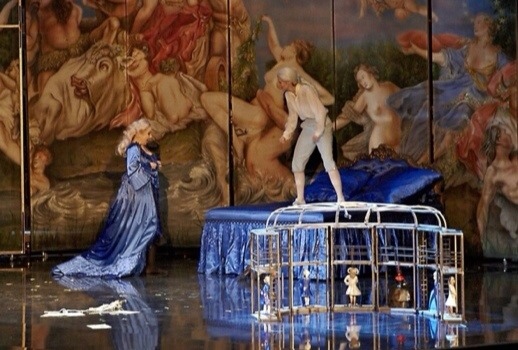
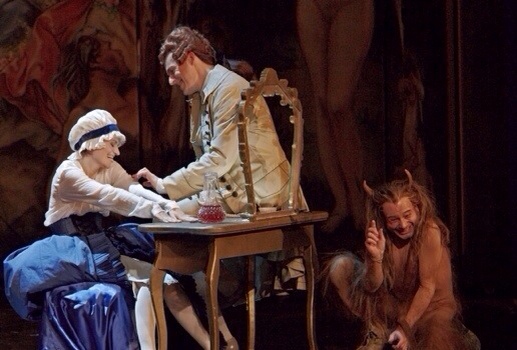
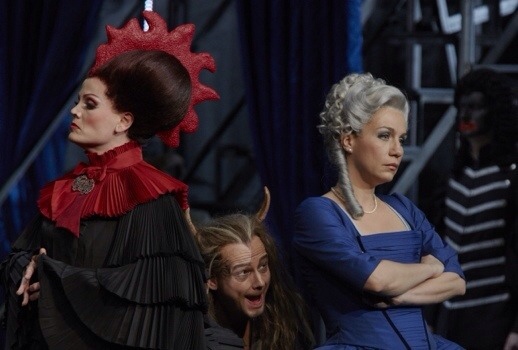
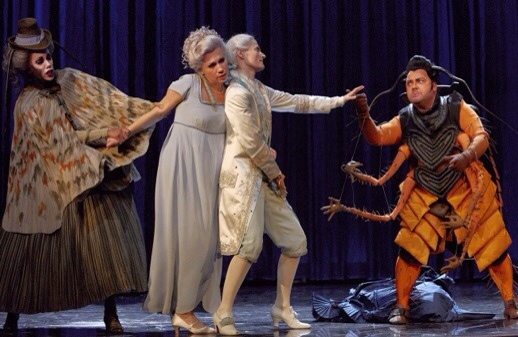












Comments